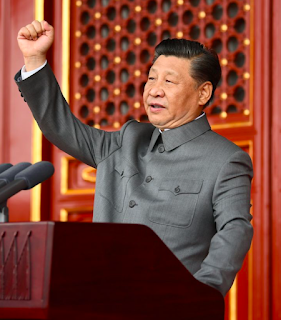 |
| It appears that President Xi has allowed Evergrande to live a while longer (WSJ). |
How big is Evergrande?In past years investors outside China wouldn't have been too worried about the collapse of an Evergrande because of the belief that the Chinese government would back the debt obligations of large Chinese companies. (This is the Chinese version of the Fed put, a market understanding based on past Fed behavior, that the U.S. government would stop losses from becoming too deep and widespread and possibly jeopardize the entire financial system.)
Evergrande had nearly $78 billion in revenue last year and hundreds of projects in more than 200 Chinese cities. For years it used borrowed money and presold apartments to aggressively amass land and develop projects. Along the way the company paid out billions of dollars in dividends to shareholders, including the equivalent of more than $5 billion over the past three years to founder, top shareholder and Chairman Hui Ka Yan.
Why is Evergrande facing a crisis?
Problems started to emerge last year when pandemic lockdowns hurt property sales for months, and they snowballed into concerns about a cash crunch last fall. Meanwhile, China’s efforts to crack down on borrowing by real-estate developers via limits known as the “three red lines” kept the company from taking on new debt. Cash is so short the company this summer started paying some suppliers with unfinished apartments instead of money. Its struggles sparked protests at its headquarters in Shenzhen.
How much does Evergrande owe?
The company had the equivalent of around $88 billion in outstanding debt at the end of June, about 42% coming due in less than a year. Its total debt burden is the most of any publicly traded real-estate management or development company globally, according to S&P Global Market Intelligence. Research firm Capital Economics estimates Evergrande also has sold an estimated 1.4 million apartments, worth $200 billion, that it hasn’t yet completed.
In the latter half of the month there have been signs that the "Xi put" is operational, with some steps being taken to shore up Evergrande which nevertheless did miss debt payments in September.
The U.S. stock markets continued to drop in late September because of higher interest rates (the cause of the drop in late 2018), supply shortages, and inflation. The Chinese economic slowdown is part of the reason for pessimism, but at least for now a financial crisis is off the table.
Some investors have seized on these government signals as an opportunity to bargain-hunt Chinese bonds and stocks. Too soon and too rich for my blood.
No comments:
Post a Comment